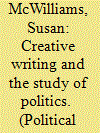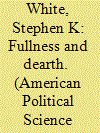| Srl | Item |
| 1 |
ID:
155742


|
|
|
|
|
| Summary/Abstract |
Creative writing is not part of professional training in political science. Scholars in other fields, though, testify to the benefits of creative writing assignments, and my experiences teaching an undergraduate course on Politics and Literature suggest that there may be value in adding creative writing into certain political science courses. As with other forms of non-academic writing that political scientists identify as enriching, creative writing allows students to consider politics from multiple perspectives and expands their communicative powers. Working at the craft of storytelling—as opposed to abstract argumentation—can help students to think through key claims in contemporary political thought. Moreover, in this age of “alternative facts,” doing creative writing in a politics course may help students hone a critical skill of citizenship: thinking about the news in terms of narrative. In this essay, I consider the advantages and challenges of bringing creative writing into the study of politics.
|
|
|
|
|
|
|
|
|
|
|
|
|
|
|
|
| 2 |
ID:
105201


|
|
|
|
|
| Publication |
2010.
|
| Summary/Abstract |
How should inquiry into ethical-political life come to terms with "depth experience?" By this, I mean extraordinary experience that breaks into the familiar frames of meaning and reasoning that undergird everyday life, bringing some sort of transformation or significant solidification of basic commitments or identity. Stated in this abstract fashion, my question is likely to seem rather bewildering or uninteresting for the study of politics. But its potential significance becomes apparent if one mentions George W. Bush and being "born again." This article speculates more broadly about such experience, expanding the focus beyond theists and "limit" experiences. When one does this, depth experience need not be thought of as anathema to political theory. Rather, I show that it can be cultivated in such a way as to animate an admirable "bearing" on the part of citizens of affluent, late-modern societies and cohere with certain fundamentals of deliberative democracy.
|
|
|
|
|
|
|
|
|
|
|
|
|
|
|
|